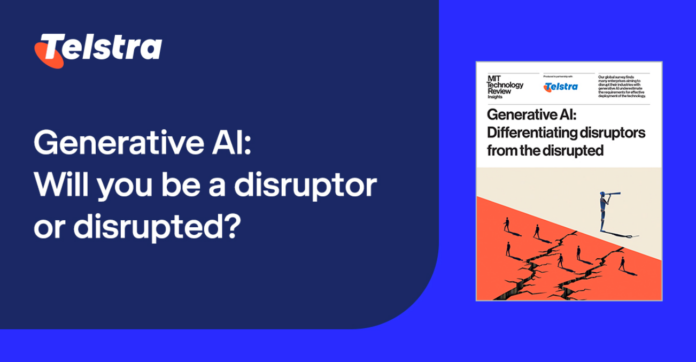Most businesses are seeking to disrupt their industries using generative artificial intelligence (AI), but only a small proportion believe they have the right level of technology and other attributes such as funding, culture and skills to support its rapid adoption.
This is among findings of a global study by MIT Technology Review Insights (MITTR) which, in partnership with Telstra International, polled 300 business leaders across the Asia-Pacific region, the Americas, and Europe.
Results show that those with the most experience of rolling out generative AI have even less confidence in their IT, suggesting many businesses underestimate the requirements for its effective deployment.
This implies that their plans to be disruptors—rather than the disrupted—may well flounder over problems that many respondents appear not to appreciate fully.
The respondents mostly manage information technology, data, and data engineering-related functions, and represent a broad spectrum of industries. These include financial services, banking, and insurance, consumer packaged goods and retail, manufacturing and automotive, technology and telecom, logistics, energy, oil, and gas, and media and communications.
Geraldine Kor, head of global enterprise at Telstra International, said that as the world becomes increasingly digitised and human-to-machine interactions flourish, being able to process data to drive informed real-time or near real-time business decisions is paramount.
“When implemented successfully, this proficiency will be a game-changer for most organisations, and will distinguish leaders from followers,” said Kor. However, building end-to-end capabilities to handle large datasets, accurately contextualise the data for business value and ensure the responsible and ethical application of AI is extremely challenging.”
The study highlights the following key findings. First, executives expect generative AI to disrupt industries across economies. Overall, three out of five respondents agree that generative AI technology will substantially disrupt their industry over the next five years.
Second, the majority do not see AI disruption as a risk and instead hope to be disruptors. Rather than being concerned, 78% of respondents see generative AI as a competitive opportunity.
Third, despite expectations of change, few companies went beyond experimentation with, or limited adoption of, generative AI in 2023. Although most (76%) companies surveyed had worked with generative AI in some way last year, few (9%) had adopted the technology widely.
Fourth, companies have ambitious plans to increase adoption in 2024. Respondents expect to frequently apply the technology in customer experience, strategic analysis, and product innovation areas by end-2024.
Fifth, companies need to address IT deficiencies or risk falling short of their generative AI ambitions. Fewer than 30% of respondents rank IT attributes at their companies as conducive to rapid adoption of generative AI.
And sixth, other factors can also undermine the successful use of generative AI. Respondents, both in general and AI early adopters, also report non-IT impediments to the extensive use of generative AI — including regulatory risk (77%); budget constraints (56%); competitive environment; organisational culture; and short supply of talent and experts.
















